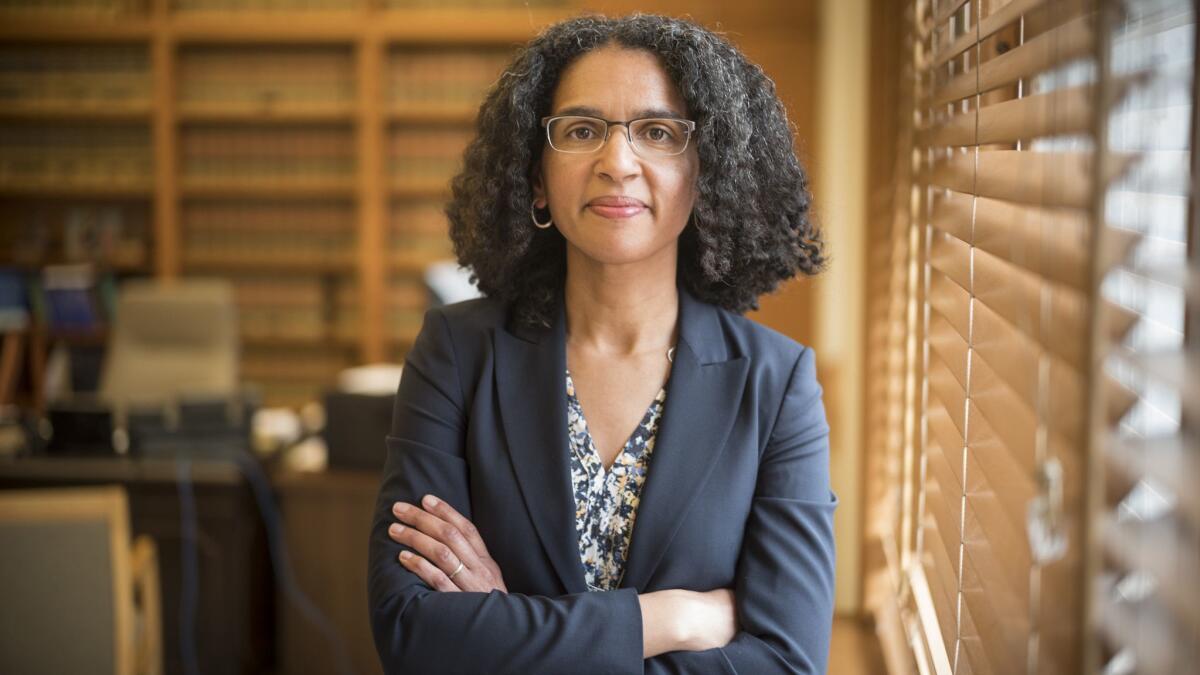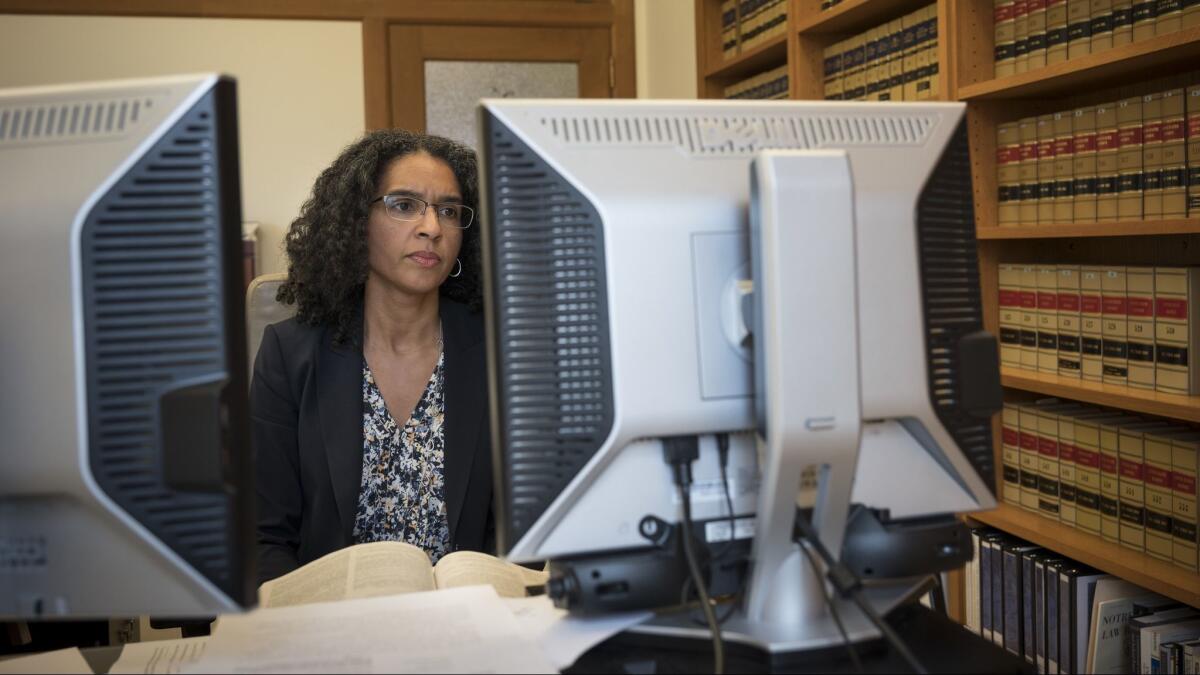As Gov. Jerry Brown ponders a California Supreme Court vacancy, one of his earlier appointees defies expectations

Justice Leondra R. Kruger, the youngest California Supreme Court justice in modern history, had just given birth.
She flew from the Bay Area with her 4-week-old daughter in 2016 for court hearings in Los Angeles, donning a black robe while her mother-in-law cared for the newborn in an upstairs office. Kruger was still nursing.
The first justice to give birth while in office, the seventh female justice in the court’s history and its fourth African American, Kruger has been forging a singular path on the state’s most prestigious court.
Four years after her swearing-in, the Los Angeles County native and former U.S. Supreme Court practitioner has become the most unpredictable of Gov. Jerry Brown’s three appointees on the seven-member court.
She is more likely than her Democratic colleagues to vote with the Republican appointees because of her “inherently lawyerly caution,” eschewing sharp shifts in the law, said Kirk C. Jenkins, an appellate lawyer who studies and writes about the court.
Colleagues describe her as meticulous, hewing to the precise text of laws and ruling as narrowly as possible out of concern that a result in one case could have unintended consequences in another.
While Brown’s other appointees, Goodwin Liu and Mariano-Florentino Cuellar, have used their perches on the state’s highest court to try to set clear rules or steer policy, Kruger strives to keep changes in the law incremental.
“She is clearly more conservative, at least in criminal cases, than Goodwin Liu or Tino Cuellar,” said UC Berkeley law school dean Erwin Chemerinsky.
He attributed the difference to Kruger’s background. She served for several years as a lawyer in the U.S. solicitor general’s office, representing the views of the Obama administration in civil and criminal cases before the U.S. Supreme Court.
Others say her approach reflects a careful and deliberate nature. She appears more concerned about following precedent than making policy, and her caution makes her wary of taking cases that pose questions without ready answers, analysts said.

“My approach reflects the fact that we operate in a system of precedent,” Kruger, 41, said in an interview. “I aim to perform my job in a way that enhances the predictability and stability of the law and public confidence and trust in the work of the courts.”
Brown has said he is taking his time to fill a nearly year-old vacancy on the court because his fourth appointee may be “very decisive,” forming a new majority. But the three he already has chosen do not vote as a bloc.
Several days ago, Cuellar wrote a majority decision upholding a death penalty verdict and sentence. The Republican appointees joined Cuellar. Liu and Kruger dissented.
Liu, a former law professor, writes concurrences and dissents fueled with independent scientific and social research, drawing attention to problems that the Legislature or other policymakers might want to address.
Cuellar aims for clarity in the law, even if that means changing it more than incrementally, to provide direction to lower courts. Before his appointment, he ran an institute and taught law at Stanford University and served in the White House during Democratic administrations.
Kruger thinks and approaches cases like the appellate lawyer she has been for most of her career, attorneys said.
During hearings, “she is most likely to ask you that question you probably have been wrestling with … the most difficult one,” Jenkins said. “She has an impressive intellect.”
To be sure, Kruger and her two Democratic colleagues agree on many cases. In fact, the court often rules unanimously. But the differences in the Democratic appointees have arisen in closely watched cases.
Kruger wrote a majority ruling that declined to strike down a California law that makes it difficult for someone arrested but not convicted — and possibly not even charged — to remove his or her DNA profile from a state database.
Kruger said the case was the wrong vehicle for deciding the issue.
Liu, Cuellar and a Democratic appointee filling in on the court disagreed, citing the California Constitution’s protection of privacy.
California’s top court has the final say on state law, and justices in the past have used the California Constitution to forge a progressive path independent of the U.S. Supreme Court.
California, for instance, struck down laws prohibiting interracial marriage and same-sex marriage before the U.S. Supreme Court acted.
Kruger also joined the more conservative justices in voting against review of a case in which Orange County judges challenged the district attorney’s office for refusing to appear before a judge who had angered the prosecutors.
Chemerinsky, who represented the judges against the prosecutors, said the court of appeal, which ruled 2 to 1 for the prosecutors, clearly had expected the state high court to take the case.
Kruger was a mystery to most of California’s legal community when Brown chose her for the court. She had spent most of her career out of state.
California Court of Appeal Justice J. Anthony Kline, a friend of Brown’s, said she came highly recommended.
U.S. Supreme Court Justice Elena Kagan was “incredibly effusive about her” and called her “one of the best advocates in the Department of Justice,” Kline said.
Brown offered her the position the day after interviewing her, Kruger said, and she soon packed up her family and moved from Washington to the East Bay. She will appear on the November ballot unopposed for a 12-year term.
Kruger grew up in Pasadena and South Pasadena, the daughter of two doctors, one a native of Jamaica, the other the son of Eastern European Jewish immigrants.
She attended Pasadena’s prestigious Polytechnic School, where alumnus Joe Mathews, now a journalist, recalled her as a “nerdy student in a nerdy school.”
After school she often hung around her mother’s pediatric practice, where she did homework amid the sounds of crying babies and made little ornaments from tongue depressors and cotton swabs.
She has several half-siblings and regards as a sister a cousin from Jamaica who lived with her family when Kruger was a teenager.
Kruger received her undergraduate degree from Harvard and law degree from Yale, where she also was the first black woman to be editor in chief of the law journal.
In interviews, her colleagues on the court described her as quiet and even-tempered with a sparkling sense of humor that can be self-deprecating. They said she writes well, researches thoroughly and can concisely and quickly summarize complicated matters.
“She is just a very careful jurist,” said Justice Carol A. Corrigan, an appointee of former Gov. Arnold Schwarzenegger, when asked if Kruger was more conservative than Brown’s other picks.
Though Kruger is confident, she does not seek the limelight, those who know her said.
UC Berkeley law professor Melissa Murray, who studied law with Kruger at Yale, recalled that black law students organized a dinner party to celebrate Kruger landing at the helm of the law review, an important milestone. They gave speeches about what her achievement meant to them.
Kruger, though, just seemed to want to get the attention off her, said Murray.
“I don’t think she is someone who clamors for it all,” Murray said.
While some justices prefer tablets, Kruger, a high school and college journalist, likes paper. She usually has a tall stack of written briefs next to her on the bench.
”There is nothing like having a pen in your hand,” she said with a sigh.
She likes literary fiction, particularly the works of Zadie Smith, but as a high court justice and a mother of two young children, her free time is limited.
“I will confess that much of my pleasure reading is limited to ‘Goodnight Moon,’” she said.
Twitter: @mauradolan
More to Read
Sign up for Essential California
The most important California stories and recommendations in your inbox every morning.
You may occasionally receive promotional content from the Los Angeles Times.











